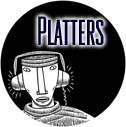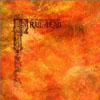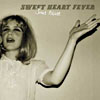
Comment
on this story
|
 |

This Week: Follow the Trail of Dead to your living-room couch and chill out to a sweet, sad lullaby
...And You Will Know Us By the Trail of Dead
Source Tags & Codes (Interscope)

Source Tags & Codes opens with a few seconds of gentle radio static, followed by some soft guitar strumming. But you can feel the storm coming and it quickly erupts—fuzzy, hyper guitars and thrashing drums and the near scream of Conrad Keely's voice.
Trail of the Dead—an Austin, Texas, quartet—never really let up on the fierce assault of guitars. But, with the major-label debut of Source Tags & Codes, the group has reined in its approach from its previous work, creating an album that blends art-rock noise and punk-rock melodies. Some of it could almost pass for pop. Although it's more accessible, some (including me) will miss the experimentation and free-floating nature of their earlier work.
They've been compared to Sonic Youth, but I find a lot of Source Tags & Codes sounds like Fugazi (especially, "Baudelaire" and "Days of Being Wild"). Fugazi is essentially political and puritan in its approach to life, railing against the system and government. Trail of Dead is instead obsessed with gothic mysticism, death and chaos, desire and guilt—screaming against a vague existential grief. "It's hard to imagine, it's so hard to perceive; to find an expression for what it all means. All panic and struggle, all death and decay are coming together in relative ways," Keely sings on "Relative Ways," probably the most catchy song on the album. The songs—combined with the CD's striking artwork—all seem scattershot, disconnected. But that disconnection only reflects Trail of Dead's obsession with nihilism and chaos. "There is no where to hide. Ride the apocalypse. Fallen angel no need to hide," Keely sings on "Heart in the Hand of the Matter." Fortunately, that nihilism isn't reflected in the music's tone. Rather, it's a joyous rage against the dying of the light.
—Joe Tarr
Various Artists

The Chillout Session (Ministry of Sound)
From the club-culture retailer Ministry of Sound, which sells everything from music to clothing to rave vacation packages, comes this carefully sequenced two-disc set of modern mellowness. The aim is to recreate the ambiance of a club chill-out room for home consumption. It certainly succeeds at that; although the selections range from true bliss-out ambiance to dubby grooves you could theoretically dance to, there's not much here that would disturb an afternoon nap.
At the same time, The Chillout Session provides a pretty good all-in-one overview of the trippier side of the electronica spectrum. It kicks off, appropriately, with a track from Massive Attack, the key outfit in the Bristol, U.K., collective that gave birth to trip-hop in the early 1990s. Also on hand are early scene-builders like The Stone Roses, Beloved and acid jazz innovators A Man Called Adam. More current big names in the mix include Zero 7, Air, Underworld, Boards of Canada, and the Future Sound of London. Like a good DJ, the compilation is admirably broad-minded, more concerned with maintaining the mood than genre purity. Thus, actual rock groups like Radiohead, Badly Drawn Boy and Sigur Ros all qualify for inclusion, as does a remix from the Nashville-based Lambchop.
Altogether, it makes for some very easy listening—and I don't mean that in a bad way. Whether you're looking for cool cocktail party music, a soundtrack for your astral travels, or just a collection of warm, friendly grooves, you've come to the right place.
—Jesse Fox Mayshark
Scout Niblett

Sweet Heart Fever (Secretly Canadian)
"It's only pure song that can soothe me," Scout Niblett pines on her debut, Sweet Heart Fever. A gem released last fall, the album is soothing in its own way, without being maudlin or escapist.
Sweet Heart Fever is a sparse affair with Niblett (a Briton whose real first name is Emma) backing herself with just an electric or acoustic guitar or bass or singing a cappella. This approach might wear thin, but Kristian Goddard occasionally adds some nice punch and tension on drums. (On "Check Out The Maker," Niblett sings with only Goddard's marching drum beat as accompaniment.)
Vocally, Niblett is eerily similar to Cat Power—both the sound of her voice and her singing style, which is steeped in Appalachian accents. But while Cat Power is ethereal and brooding, Niblett's music is spiced-up traditional folk ballads. The one cover on the album is the traditional lullaby, "Lula." Her own songs deal with love, seduction and heartbreak. On the sexy, bouncy "Big Bad Man" she offers to cook some "real food" for the big bad man, telling him "Everyone seems so scared of you...They say that you eat kids too, Is it true?."
Her voice has a wide range, nicely covering the joyous, painful and ambiguous parts of love. On the mournful title tract she begs, "Sweet heart fever/ Take it away from this body." In her voice, the agony is palpable. But as she sings, her pain and ours get a little lighter.
—Joe Tarr

April 25, 2002 * Vol. 12, No. 17
© 2002 Metro Pulse
|